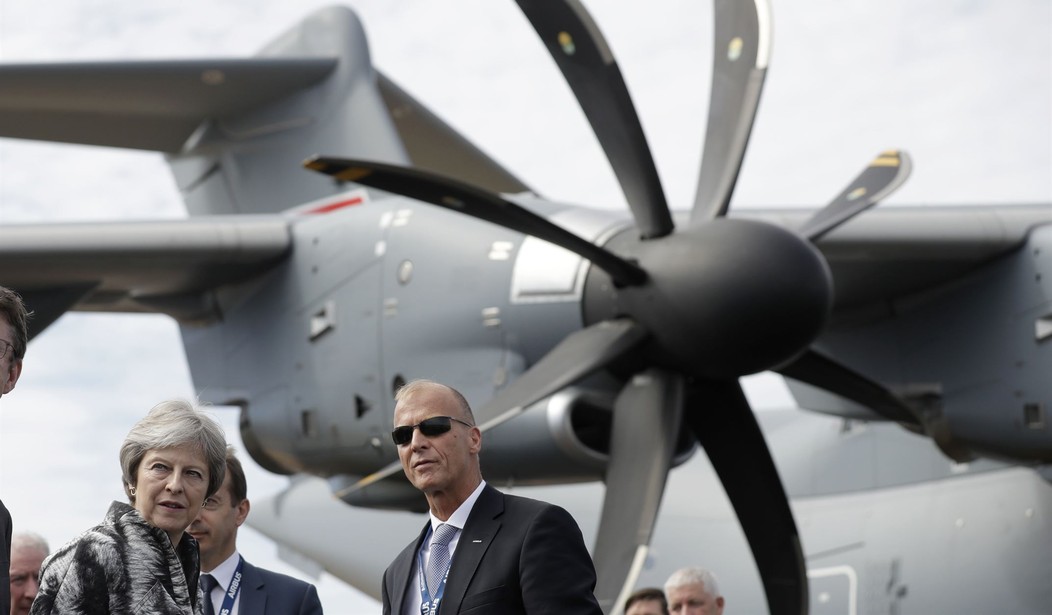If a company seeking to be a federal contractor has lobbied against America’s decided-upon policy regarding the conflict between Russia and Ukraine, it seems like a no-brainer to not contract with them. Yet, one company trying to get a slice of the defense contracting pie is trying to do just that, pushing hard for an exemption to this policy for a Russian-sourced metal used in making aircraft components. It would be a rational decision by those in Pentagon leadership determining who gets contracts from the U.S. government to just say no to any company that is working to create gaps in sanctions that were placed on an adversary for an unprovoked invasion of its neighbors—an invasion that has had horrendous consequences for the people of Ukraine, and which the U.S. is spending billions to oppose.
The European-based company, Airbus, is trying to get contracts to manufacture refueling tankers for the U.S. Air Force while at the same time utilizing Russian titanium to manufacture parts for aircraft. Airbus has created a conflict of interest that should be resolved by the U.S. government barring the company from federal contracts until they stop importing titanium from Russia or the war and/or sanctions are ended.
Of the Pentagon slice of the defense budget, $773 billion was requested for the Department of Defense, and many in Congress want to boost that number. This budget is the largest ever. Funding is the easy part of the process. The hard part is spending smart to make sure there is oversight. Just look at the Paycheck Protection Program (PPP) that was rife with fraud and in dire need of some policies to keep the program from wasting taxpayer cash. Taxpayers wanted their money to be used to keep small businesses afloat, not to buy expensive cars and beachfront homes for fraudsters.
Large programs allow more flexibility in setting priorities. When you look at the PPP program and the fraud that was allowed, it shows the difficulty of oversight of how money is spent. As reported by NBC News, the PPP program resulted in fraud by “as much as $80 billion — or about 10 percent — of the $800 billion handed out in a Covid relief plan known as the Paycheck Protection Program, or PPP.” That is only the tip of the iceberg because “that’s on top of the $90 billion to $400 billion believed to have been stolen from the $900 billion Covid unemployment relief program — at least half taken by international fraudsters — as NBC News reported last year.” Add in “another $80 billion potentially pilfered from a separate Covid disaster relief program,” and you have a serious problem on your hands. This was an oversight problem.
Recommended: Appalling: Struggling Soldiers Told to Apply for Food Stamps as Biden Sends Billions for Ukraine Military
In addition to the fraud problem with large programs, the government needs to make sure taxpayers are not indirectly paying to forward a company’s lobby against America’s best interests. The Wall Street Journal reported in June that “Airbus, the world’s largest commercial plane maker, is still importing hefty amounts of titanium from one of the country’s (Russia) biggest exporters.” The Journal reported that Airbus has “called for the European Union to hold off imposing sanctions on the metal.” The company uses titanium to manufacture components of its aircraft. If the Pentagon gives billion in taxpayer cash to a foreign company, one expects that company not to use American-sourced money to oppose American sanctions.
This is relevant to the Pentagon Airbus controversy because it will be very difficult to provide significant oversight on how Airbus uses the money when the Pentagon is responsible for over $700 billion in spending. It is arguable that when U.S. taxpayer money goes to Airbus to build aircraft for the Pentagon, some of that money will go right to a Russian titanium company, VSMPO-Avisma. It is a waste for taxpayers to send money to Russian companies when American companies are barred from engaging in commerce in Russia.
This should not be taken to mean that the Pentagon is rife with fraud. Far from it. But any time taxpayer monies are being spent, great care must be taken to ensure that such spending doesn’t support entities that are actively engaged in efforts that are contrary to established foreign policy.
At the very least, huge spending plans need oversight, and lawmakers should not make decisions that either waste money or harm national security. Giving taxpayer cash to Airbus seems to fall into the category of spending taxpayer money that will not enhance national security.
It is time for the federal government to spend smart and not give out cash to foreign companies that do not have America’s interests at heart.









Join the conversation as a VIP Member